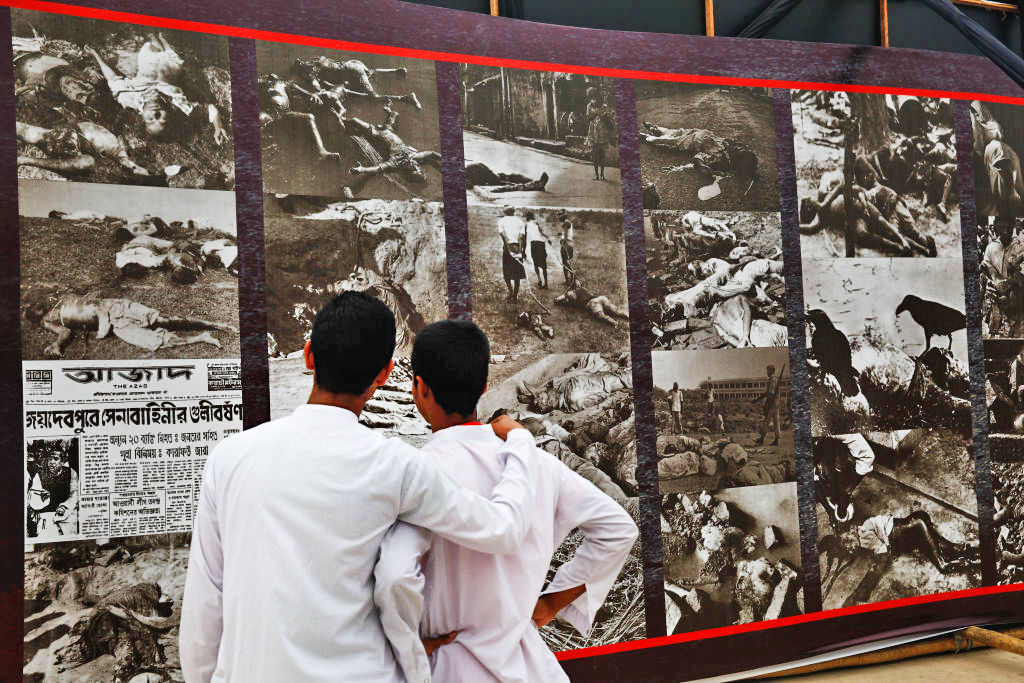Today is the 50-year anniversary of Bangladesh’s birth as an independent nation-state.
Following the bloody 1947 partition, West Pakistan (now modern-day Pakistan) and East Pakistan (now Bangladesh) were created under a singular Islamic republic — separated by the width of India. This unworkable arrangement came to a head after the 1970 Pakistani general election. East Pakistan’s Awami League — currently the governing party of Bangladesh — won the general election by defeating West Pakistan’s Pakistan People’s Party (PPP). Following West Pakistan’s refusal to respect the result, Awami League leader Sheikh Mujibur Rahman declared national independence.
What followed was a brutal and devastating liberation war that lasted until Bangladesh’s ‘Victory Day’ on 16 December 1971. During the War, West Pakistan launched two particularly horrific initiatives in East Pakistan — the systematic sexual torture of Bangladeshi women and an orchestrated campaign to eradicate the newly-independent country’s ‘backbone’ of medical professionals, mechanical engineers, and leading educationalists.
It is testament to the perseverance and ingenuity of the Bangladeshi people that they moved on from such horrors and overturned these disadvantages, with Pakistan now trailing Bangladesh in a number of socio-economic metrics — including literacy rate, life expectancy, GDP per capita, and female economic activity. Bangladesh also has a superior ranking to Pakistan for Freedom House’s Global Freedom Index and the Economist Intelligence Unit’s Democracy Index.
What Bangladesh’s 1971 Liberation War teaches us is that national sovereignty — a country in charge of its political, cultural, and economic destiny — is something to be treasured and protected. Muslims, Hindus, Christians, Buddhists, and secularists made the ultimate sacrifice in the face of a belligerent Islamist force which sought to keep together the world’s first Islamic republic.
In the west, we rarely hear about the 1971 War. Despite its geopolitical significance, it is curiously absent from discussion, particularly in the context of deepening UK-Bangladeshi ties. That is, in large part, because it does not fit in with the western progressive framing of conflicts and geopolitical disputes through the prism of the ‘Non-Muslim on Muslim’ oppression, but is more reluctant to engage with historical cases in which the belligerent perpetrator is overwhelmingly Muslim. To do so would undermine the structure of their ‘global oppression pyramid’ which considers being Muslim as an ‘oppressed characteristic’. Unfortunately, this not only masks the Islamist persecution of non-Muslim groups, but also overlooks conflicts where secular-minded Muslims have been systematically killed, maimed, and tortured by radical co-religionists.
Those who fought for Bangladesh’s liberation should never be forgotten. Their contribution does not deserve to be whitewashed by those who are selective in the cases of historical atrocities they wish to engage with and draw attention to. This includes a number of British-Muslim identitarian organisations who would like nothing more than the airbrushing of the 1971 Liberation War from the pages of history in the name of ‘Islamic solidarity’.
Bangladesh is a relatively young and rapidly-developing nation — the circumstances surrounding its liberation should be remembered, with its future potential being recognised by a post-Brexit UK which is looking to boost its ties with rising members of the Commonwealth.
Dr Rakib Ehsan is an independent analyst specialising in British ethnic-minority public attitudes.











Join the discussion
Join like minded readers that support our journalism by becoming a paid subscriber
To join the discussion in the comments, become a paid subscriber.
Join like minded readers that support our journalism, read unlimited articles and enjoy other subscriber-only benefits.
Subscribe